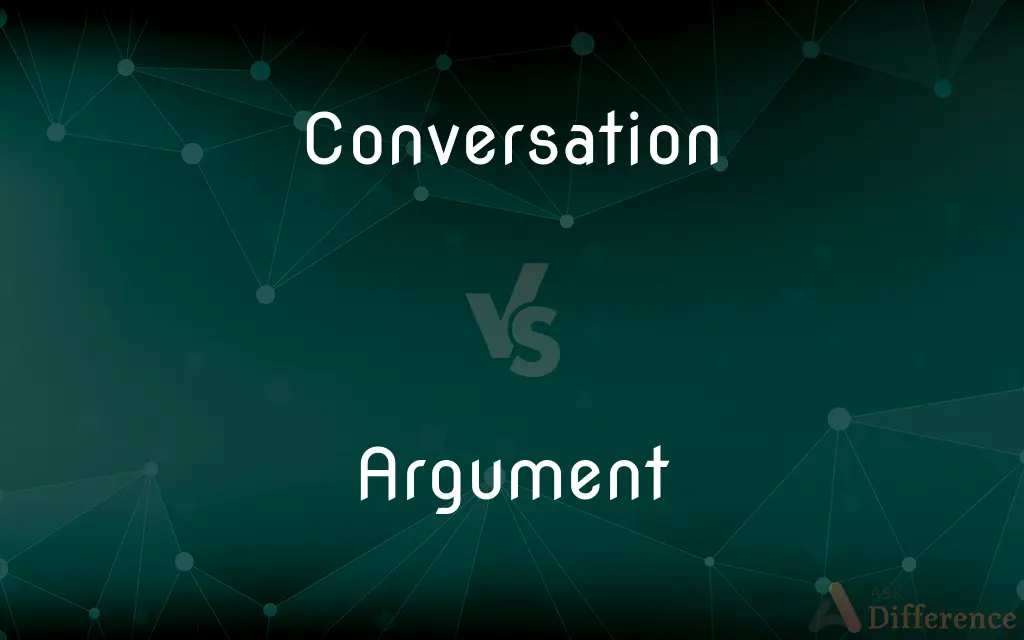Conversation vs. Argument — What's the Difference?
By Tayyaba Rehman & Urooj Arif — Updated on April 3, 2024
A conversation is an exchange of ideas or thoughts in a relaxed, informal setting, while an argument is a discussion involving differing views, often with the aim of persuading or reaching an agreement.

Difference Between Conversation and Argument
Table of Contents
ADVERTISEMENT
Key Differences
Conversations are characterized by the mutual exchange of ideas, information, or feelings, often conducted in a friendly, informal manner. They are typically free-flowing and can cover a variety of topics, allowing participants to learn from each other and share experiences. On the other hand, arguments focus on presenting and debating differing opinions or claims, usually with the objective of persuading the other party or reaching a consensus. While arguments can be constructive and aim for a resolution, they often involve a level of disagreement or conflict.
In conversations, participants are generally open to hearing different perspectives without the need to change the other person's viewpoint. This openness promotes a sense of understanding and connection among individuals. Arguments, however, are driven by the intent to prove a point or establish the validity of one's opinion over others, which can sometimes lead to heated exchanges or misunderstandings if not approached with respect and a willingness to listen.
A key element of conversations is the mutual respect and interest in the dialogue, which fosters a positive environment for communication and relationship building. Conversations can shift between topics seamlessly and often include personal anecdotes and humor. In contrast, arguments are more structured around a specific issue or set of issues, with participants marshaling evidence and reasoning to support their positions, which can limit the scope of discussion to the topic at hand.
Effective conversations enhance mutual understanding and empathy, allowing participants to gain new insights or perspectives without necessarily agreeing on every point. They contribute to building and maintaining relationships. Conversely, arguments, especially when conducted constructively, can clarify misunderstandings, deepen understanding of complex issues, and lead to the resolution of disputes. However, they require careful navigation to avoid damaging relationships.
The role of emotions in each type of interaction differs significantly. Conversations tend to maintain a neutral or positive emotional tone, encouraging participants to remain engaged and open. Arguments, while they can be passionate, risk veering into negative emotional territory, which can impact the participants' willingness to continue engaging constructively.
ADVERTISEMENT
Comparison Chart
Purpose
Exchange of ideas, social interaction
Persuasion, resolution of differing views
Tone
Informal, friendly
Can vary from calm to confrontational
Structure
Free-flowing, no fixed agenda
Focused on specific issues or disagreements
Emotional Tone
Neutral to positive
Can range from passionate to hostile
Outcome
Enhanced understanding, relationship building
Clarification of viewpoints, resolution of issues
Compare with Definitions
Conversation
An informal dialogue without a competitive edge.
The conversation at the dinner table was light and cheerful.
Argument
A dialogue that can lead to conflict or resolution.
Their argument ended in a better understanding of each perspective.
Conversation
A means of sharing experiences or information.
Through conversation, they discovered common interests.
Argument
A discussion aimed at persuading or proving a point.
Their argument about environmental policies was intense.
Conversation
A non-confrontational way of communicating.
They had a conversation to catch up on each other’s lives.
Argument
A debate over differing views or opinions.
They had an argument over the best approach to education reform.
Conversation
A casual exchange of thoughts between individuals.
Their conversation over coffee touched on various topics.
Argument
An exchange that may involve evidence and reasoning.
The argument about historical events required factual evidence.
Conversation
An opportunity for social connection and understanding.
Their conversation helped them understand each other better.
Argument
An interaction that can be passionate or heated.
The argument got heated, but they agreed to disagree respectfully.
Conversation
Conversation is interactive communication between two or more people. The development of conversational skills and etiquette is an important part of socialization.
Argument
In logic and philosophy, an argument is a series of statements (in a natural language), called the premises or premisses (both spellings are acceptable), intended to determine the degree of truth of another statement, the conclusion. The logical form of an argument in a natural language can be represented in a symbolic formal language, and independently of natural language formally defined "arguments" can be made in math and computer science.
Conversation
A talk, especially an informal one, between two or more people, in which news and ideas are exchanged
She picked up the phone and held a conversation in French
The two men were deep in conversation
Argument
An exchange of diverging or opposite views, typically a heated or angry one
There was some argument about the decision
I've had an argument with my father
Heated arguments over public spending
Conversation
The exchange of thoughts and feelings by means of speech or sign language
Gifted in the art of conversation.
Argument
A reason or set of reasons given in support of an idea, action or theory
He rejected the argument that keeping the facility would be costly
There is a strong argument for submitting a formal appeal
Conversation
An instance of this
Held a long conversation on the subject.
Argument
An independent variable associated with a function or proposition and determining its value. For example, in the expression y = F(x₁, x₂), the arguments of the function F are x₁ and x₂, and the value is y.
Conversation
Expression and exchange of individual ideas through talking with other people; also, a set instance or occasion of such talking.
I had an interesting conversation with Nicolas yesterday about how much he's getting paid.
Argument
Any of the noun phrases in a clause that are related directly to the verb, typically the subject, direct object, and indirect object.
Conversation
(fencing) The back-and-forth play of the blades in a bout.
Argument
A summary of the subject matter of a book.
Conversation
The protocol-based interaction between systems processing a transaction.
Argument
A discussion in which the parties involved express disagreement with one another; a debate
Philosophical arguments over the nature of existence.
Conversation
(obsolete) Interaction; commerce or intercourse with other people; dealing with others.
Argument
An angry discussion involving disagreement among the participants; a quarrel
The roommates had an argument about whose turn it was to wash the dishes.
Conversation
(archaic) Behaviour, the way one conducts oneself; a person's way of life.
Argument
(Archaic) A reason or matter for dispute or contention
"sheath'd their swords for lack of argument" (Shakespeare).
Conversation
(obsolete) Engagement with a specific subject, idea, field of study etc.
Argument
A course of reasoning aimed at demonstrating truth or falsehood
Presented a strong argument for the arts in education.
Conversation
To engage in conversation (with).
Argument
A fact or statement put forth as proof or evidence; a reason
The current low mortgage rates are an argument for buying a house now.
Conversation
General course of conduct; behavior.
Let your conversation be as it becometh the gospel.
Argument
A set of statements in which one follows logically as a conclusion from the others.
Conversation
Familiar intercourse; intimate fellowship or association; close acquaintance.
I set down, out of long experience in business and much conversation in books, what I thought pertinent to this business.
Argument
A summary or short statement of the plot or subject of a literary work.
Conversation
Commerce; intercourse; traffic.
All traffic and mutual conversation.
Argument
A topic; a subject
"You and love are still my argument" (Shakespeare).
Conversation
Colloquial discourse; oral interchange of sentiments and observations; informal dialogue.
The influence exercised by his [Johnson's] conversation was altogether without a parallel.
Argument
(Logic) The minor premise in a syllogism.
Conversation
The use of speech for informal exchange of views or ideas or information etc.
Argument
The independent variable of a function.
Argument
The angle of a complex number measured from the positive horizontal axis.
Argument
(Computers) A value used to evaluate a procedure or subroutine.
Argument
(Linguistics) A word, phrase, or clause in a semantic relation with a word or phrase and that helps complete the meaning of that word or phrase, such as a noun phrase that is the object of a verb. The clause that we go is an argument of the verb suggest in the sentence I suggest that we go.
Argument
A fact or statement used to support a proposition; a reason.
Argument
A series of propositions organized so that the final proposition is a conclusion which is intended to follow logically from the preceding propositions, which function as premises.
Argument
(countable) A process of reasoning; argumentation.
Argument
(countable) An abstract or summary of the content of a literary work such as a book, a poem or a major section such as a chapter, included in the work before the content itself; (figuratively) the contents themselves.
Argument
(countable) A verbal dispute; a quarrel.
The neighbours got into an argument about the branches of the trees that extended over the fence.
Argument
Any dispute, altercation, or collision.
Steve got in a physical argument with his neighbor and came away with a black eye.
While biking home, he got in an argument with the pavement.
Argument
Any of the phrases that bears a syntactic connection to the verb of a clause.
Argument
The independent variable of a function.
Argument
The phase of a complex number.
Argument
A quantity on which the calculation of another quantity depends.
The altitude is the argument of the refraction.
Argument
A value, or a reference to a value, passed to a function.
Parameters are like labelled fillable blanks used to define a function whereas arguments are passed to a function when calling it, filling in those blanks.
Argument
A parameter at a function call; an actual parameter, as opposed to a formal parameter.
Argument
A matter in question; a business in hand.
Argument
The subject matter of an artistic representation, discourse, or writing; a theme or topic.
Argument
Evidence, proof; (countable) an item of such evidence or proof.
Argument
To put forward as an argument; to argue.
Argument
To adduce evidence, to provide proof.
Argument
Proof; evidence.
There is.. no more palpable and convincing argument of the existence of a Deity.
Why, then, is it made a badge of wit and an argument of parts for a man to commence atheist, and to cast off all belief of providence, all awe and reverence for religion?
Argument
A reason or reasons offered in proof, to induce belief, or convince the mind; reasoning expressed in words; as, an argument about, concerning, or regarding a proposition, for or in favor of it, or against it.
Argument
A process of reasoning, or a controversy made up of rational proofs; argumentation; discussion; disputation.
The argument is about things, but names.
Argument
The subject matter of a discourse, writing, or artistic representation; theme or topic; also, an abstract or summary, as of the contents of a book, chapter, poem.
You and love are still my argument.
The abstract or argument of the piece.
[Shields] with boastful argument portrayed.
Argument
Matter for question; business in hand.
Sheathed their swords for lack of argument.
Argument
The quantity on which another quantity in a table depends; as, the altitude is the argument of the refraction.
Argument
The independent variable upon whose value that of a function depends.
Argument
To make an argument; to argue.
Argument
A fact or assertion offered as evidence that something is true;
It was a strong argument that his hypothesis was true
Argument
A contentious speech act; a dispute where there is strong disagreement;
They were involved in a violent argument
Argument
A discussion in which reasons are advanced for and against some proposition or proposal;
The argument over foreign aid goes on and on
Argument
A summary of the subject or plot of a literary work or play or movie;
The editor added the argument to the poem
Argument
A variable in a logical or mathematical expression whose value determines the dependent variable; if f(x)=y, x is the independent variable
Common Curiosities
Can a conversation turn into an argument?
Yes, a conversation can evolve into an argument if disagreements arise and participants seek to persuade each other.
What is the importance of listening in both conversations and arguments?
Active listening is crucial in both contexts to ensure mutual understanding, respect, and productive outcomes.
Is an argument always negative?
Not necessarily. Arguments can be constructive and lead to a deeper understanding or resolution if approached with respect and open-mindedness.
What differentiates a conversation from an argument?
A conversation is a friendly, informal exchange of ideas, while an argument involves a debate over differing views, often with the goal of persuasion.
What role does body language play in conversations and arguments?
Body language can significantly impact the tone and perception of both conversations and arguments, influencing feelings of empathy or defensiveness.
How can one effectively transition from an argument back to a conversation?
By de-escalating emotions, focusing on common ground, and shifting the discussion towards mutual interests or agreeable topics.
Can arguments be beneficial?
Yes, when conducted constructively, arguments can clarify misconceptions, lead to problem-solving, and strengthen relationships through deeper understanding.
How can emotions affect an argument?
Strong emotions can escalate an argument into a confrontational or hostile exchange, detracting from constructive dialogue.
How should disagreements be handled within a conversation?
Disagreements should be approached with openness, respect, and a willingness to understand the other person's perspective.
How can one prepare for a potentially contentious argument?
Preparing with facts, maintaining a calm demeanor, and setting ground rules for respectful engagement can help.
Why is it important to maintain a positive tone in conversations?
A positive tone encourages openness, trust, and a willingness to share, enhancing social connections.
What are some strategies for keeping arguments constructive?
Staying focused on the issue, avoiding personal attacks, and striving for mutual respect and understanding are key strategies.
Share Your Discovery

Previous Comparison
Conformity vs. Deviance
Next Comparison
Mossberry vs. CranberryAuthor Spotlight
Written by
Tayyaba RehmanTayyaba Rehman is a distinguished writer, currently serving as a primary contributor to askdifference.com. As a researcher in semantics and etymology, Tayyaba's passion for the complexity of languages and their distinctions has found a perfect home on the platform. Tayyaba delves into the intricacies of language, distinguishing between commonly confused words and phrases, thereby providing clarity for readers worldwide.
Co-written by
Urooj ArifUrooj is a skilled content writer at Ask Difference, known for her exceptional ability to simplify complex topics into engaging and informative content. With a passion for research and a flair for clear, concise writing, she consistently delivers articles that resonate with our diverse audience.















































